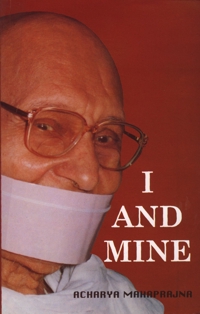
Vows have been the backbone of Indian culture. No society, which lacks will-power, can be deemed civilized, Will-power is developed through vows. That is why vows occupy the central position in Indian life.
All the Tirthankars (founders of religious doctrine) and incarnations of the deity have affirmed the importance of vows. There is no religion, which has no vows. Those who take a vow move within the circle of which the vow is the centre. The bullock bound to an oil-crusher appears to be useless. It moves all the time and yet does not inch forward. But by its will-power it goes into circular movements and helps crush the seeds to yield oil. It cannot be said that it lacks movement even though it moves within a short space. Increasing movement without yielding any results denotes failure. But where results accrue, failure does not exist.
The desire to work secretly does not exist when self-discipline is made to develop. The nation lacks lustre simply because individuals lack confidence in their ability to develop. Individual greatness will not reveal itself if no move is made to break through the narrow confines that religion has been reduced to. And if individual greatness does not reveal itself, national greatness too will find no expression.
Today man lives between two windows. One of them opens out and another opens inside. That which opens out is wide open but that which opens inside is closed. Man acts between both of them.
What is coming through the outer window is not desirable. What comes from outside is penal authority. Penal power helps propel state power and social authority. Morality will come into being if the outer window is closed. The inner window gives man the sense of duty, which lies suppressed in his inner being. One who is a stranger to the inner window is fully familiar with penal power.
Man is not an animal. Animals are driven with the help of penal power. It is a daily sight-sand being brought from rivers on the back of donkeys and donkeys being thrashed with sticks. They are animals. They cannot rebel, nor can they lodge a protest with the government. Man has memory and the power to resist. Therefore, he cannot tolerate such injustice. He cannot be driven under the threat of punishment. That country is a country of animals where people are driven on pain of punishment. The authority that man has created to rise above that exercised in relation to animals is that of vows.
Once the ruler Dilip was grazing Maharishi Vashisht's cow. Just then a tiger appeared there. The ruler came in front of the cow in order to protect it. Seeing him do this, the tiger said:

You wield absolute authority in your kingdom. You are gifted with youth and a handsome body. Why do you want to sacrifice all these merely in order to save a cow? Why do you want to pay such a heavy price for a small gain? I feel you are foolish.
Had there been a selfish person, he would have promptly run away. But the ruler did not do so. He said to the tiger:

I am a Kshatriya and have been born in a Kshatriya family. It is the duty of a Kshatriya to protect those in distress.
The ruler was prepared to sacrifice his life. He was not motivated by penal power. On the contrary an inner light surfaced and made him aware of his duty. Beyond the awareness of duty lies the awareness of the self. In a vow there is no external pressure or helplessness. The inner consciousness is awakened and consequently such a man can never do anything undesirable.
Some two thousand five hundred years ago, Magadh was ruled by King Shrenik. In it lived a butcher named Kalsaukarik. He butchered five hundred buffaloes daily. He had a son named Sulas. His mentality differed from that of his father. When Kalsaukarik died, it was time to pass on the family property to his successor. Before formal succession a buffalo was to be sacrificed. Sulas said, 'I shall not agree to it. I can 't do it.' Family pressure was brought to bear on him and Sulas agreed. The buffalo was right in front of him. The members of the family were ready to perform the ceremony. Sulas was given a sword and asked to kill the buffalo. A person whose consciousness has been awakened and in whom the power of vows has been aroused cannot do such a thing. Sulas wielded the sword, not against the buffalo but against his own feet.
People started saying, 'Such a coward does not deserve to be a successor.' He was disqualified to be the successor.
Why did Sulas act the way he did? Because be bad a vow in his mind. No one in whose mind a vow has been born can ever do injustice. In the absence of the vow penal power predominates. Penal power means external control and inner non-restraint. A vow is the fruit of a man's liberated consciousness. Transplanting vows in one's life means the birth of religion. Without such transplantation a man cannot be deemed religious. A vow is the sublime expression of social, national and individual consciousness. Awakening the dormant power of consciousness will result in the elevation of the individual, in giving a place of honour to vows in society, and in arousing religiosity. With this the closed window will turn into a lighthouse.
 Acharya Mahaprajna
Acharya Mahaprajna

